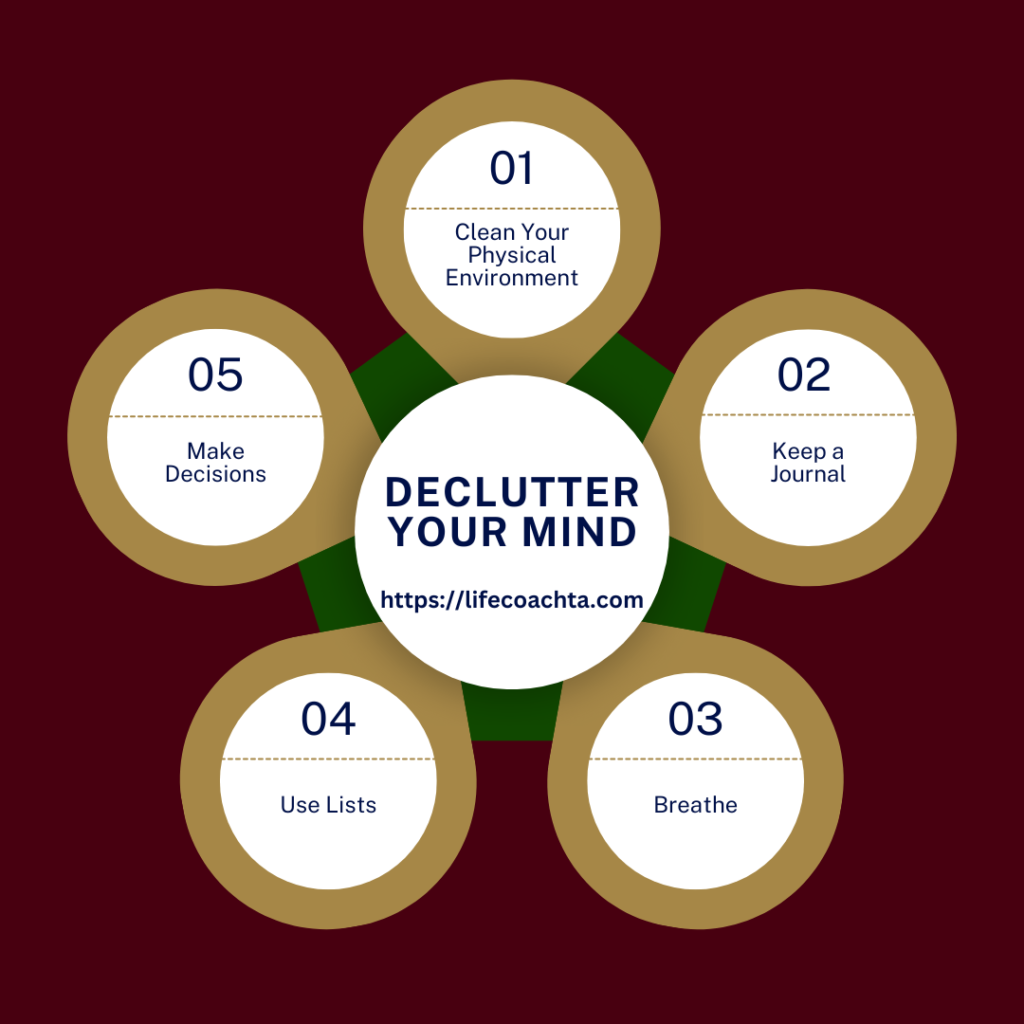There is a popular meme going around that says
My brain has too many tabs open. 4 of them are frozen and I have no idea where the music is coming from.
Have you ever felt like that?
If you were on your computer with too many tabs open you would simply click on the X in the upper right corner to close each one. When it comes to the mind, it takes a little more action.
So often when we hear the word “clutter” we think of material things. Tonight I want to explore 5 tips for decluttering the mind, helping you to close some of those tabs and turn off the music.
1-Clean Up Your Physical Environment
Studies show that having a cluttered environment can negatively affect your mind. For myself, I can attest this to be true. When I walk into my home office and see the pile of filing to be done, the stack of stuff strewed all over the floor because no one in the house where to actually put it, or the papers on top of my desk of things I need to address; my mind turns off and I get nothing done. I can sit at my desk with good intentions, I can even be busy, but the clutter stops me from being productive. Another room that affects me, perhaps you too, is the kitchen. If there are dirty dishes everywhere, the stove stacked with pots and pans that need cleaned, I am ready to order pizza. I don’t want to go in there. Are you starting to imagine a room in your life? Then take action. Intentionally, work to clean up your physical environment. Your mind will calm down in the process.
2-Keep a Journal
One problem with mental clutter is it can impede your ability to focus and get things done in a timely and accurate manner. Journaling can ‘empty’ your brain clutter. I have heard people comment they are not good writers so they can’t journal. Something you need to remember. Your journal is not a high school project you will be turning in for a passing grade. Journaling is nothing more than you releasing the thoughts from your mind. No one else will read this unless you want them to. Don’t worry about grammar or spelling. Just start writing. Write out your fears, your frustrations, your worries. Don’t forget to include your blessings. Releasing some of these thoughts will help calm your mind.
3-Breathe
The ability to enjoy your life to its fullest potential depends on your ability to prioritize and focus on what is currently happening. If your mind is cluttered, you are unable to be present in the moment. Take a moment to breathe. I recall several times, in moments of significant stress, my mother saying to me, “Terry, you need to breathe”. That seemed silly, of course I was breathing, but I learned to understand. One breathing exercise I now use often is to count 4. Join me in this Take a deep breath, silently counting to 4. Hold it to the count of 4. Slowly release the breath counting to 4. Relax to the count of 4. Could you feel a difference there? Repeat this a few times as needed. Got a cluttered mind? Breathe.
4-Use Lists
Create lists of things that need to be done. Examine the lists. What is one thing you can do that might make other things on the lists unnecessary? From your lists, categorize what needs to be done. What can you combine? Put some actions on your calendar. Make an appointment with yourself to focus on one specific thing. Organizing and accomplishing even one thing will help your mind begin to clear.
5-Make Decisions
One issue that adds to clutter is the inability to make decisions. So many times, we are overwhelmed by excessive clutter, both physical and mental, that we have trouble making decisions. The filing in my home office is a perfect example. The papers are on top of the file cabinet. Instead of making the decision of which drawer and which folder it goes into, I hold off that decision by placing it on top. To get rid of clutter, we – and that includes me – need to be able to make choices decisions on the spot. By making that decision and eliminating the physical clutter we talked about in the first step, your mind can focus uncluttered.
It’s time to close those extra tabs in your mind. It’s time to find that music and turn it off. While there are many other suggestions you can add to this list, it is my hope that this will help you get started decluttering your mind. My question to you is – where will you start? It’s one thing to hear and make the list of possible actions to
- Clean up your physical environment
- Keep a Journal
- Breathe
- Use Lists
- Make Decisions
but nothing changes until action is taken.
Change your PERSPECTIVE about the clutter in your mind, see the POSSIBILITIES you may have overlooked, and then PROCEED to take one step at a time.
You can watch/listen to this post on my youtube channel.

